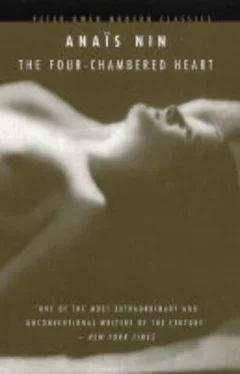Anaïs Nin - The Four-Chambered Heart
Здесь есть возможность читать онлайн «Anaïs Nin - The Four-Chambered Heart» весь текст электронной книги совершенно бесплатно (целиком полную версию без сокращений). В некоторых случаях можно слушать аудио, скачать через торрент в формате fb2 и присутствует краткое содержание. Год выпуска: 2004, ISBN: 2004, Издательство: Peter Owen Limited, Жанр: Классическая проза, Эротические любовные романы, на английском языке. Описание произведения, (предисловие) а так же отзывы посетителей доступны на портале библиотеки ЛибКат.
- Название:The Four-Chambered Heart
- Автор:
- Издательство:Peter Owen Limited
- Жанр:
- Год:2004
- ISBN:9780720611557
- Рейтинг книги:3 / 5. Голосов: 1
-
Избранное:Добавить в избранное
- Отзывы:
-
Ваша оценка:
- 60
- 1
- 2
- 3
- 4
- 5
The Four-Chambered Heart: краткое содержание, описание и аннотация
Предлагаем к чтению аннотацию, описание, краткое содержание или предисловие (зависит от того, что написал сам автор книги «The Four-Chambered Heart»). Если вы не нашли необходимую информацию о книге — напишите в комментариях, мы постараемся отыскать её.
The Four-Chambered Heart — читать онлайн бесплатно полную книгу (весь текст) целиком
Ниже представлен текст книги, разбитый по страницам. Система сохранения места последней прочитанной страницы, позволяет с удобством читать онлайн бесплатно книгу «The Four-Chambered Heart», без необходимости каждый раз заново искать на чём Вы остановились. Поставьте закладку, и сможете в любой момент перейти на страницу, на которой закончили чтение.
Интервал:
Закладка:
To help him meant to yield to Zora, knowing that she would in the end destroy their relationship.
Every day Djuna suppressed her knowledge, her lucidity; Rango would have considered them an attack upon a defenseless Zora.
Noblesse oblige enforced silence, and all her awareness of the destruction being wreaked upon their relationship—when Zora was the greatest beneficiary of this relationship—only served to increase her suffering.
Zora had mysteriously won all the battles; Rango and Djuna could never spend a whole night together.
What corrodes a love are the secrets.
This doubt of Zora’s sanity which she dared not word to Rango, which made every sacrifice futile, created a fissure in the closeness to Rango. A simple, detached understanding of this would have made Rango less enslaved, less anxious, and would have brought Djuna and Rango closer together, whereas his loyalty to all the irrational demands of Zora, her distorted interpretation of his acts as well as Djuna’s, was a constant irritant to Djuna’s intelligence and awareness.
The silence with which she accomplished her lies now became a gradual isolation in her emotions.
It was strange to be cooking, to be running errands, to be searching for new doctors, to be buying clothes, to be furnishing a new room for Zora, while knowing that Zora was working against them all and would never get well because her illness was her best treasure, was her weapon of power over them.
But Rango needed desperately to believe. He believed that every new medicine, every new doctor would restore her health.
Djuna felt now as she had as a child, when she had repudiated her religious dogmas but must continue to attend mass, rituals, kneel in prayer, to please her mother.
Any departure from what she believed he considered a betrayal of her love.
At every turn Zora defeated this battle for health. When she got a new room in the sun, she kept the blinds down and shut out air and light. When they went to the beach together up the river, her bathing suit, given to her by Djuna, was not ready. She had ripped it apart to improve its shape. When they went to the park she wore too light a dress and caught cold. When they went to a restaurant she ate the food she knew would harm her, and predicted that the next day she would be in bed all day.
She made pale attempts to take up her dancing again, but never when alone, only when Djuna and Rango were there to witness her pathetic attempts, and when the exertion would cause her heart to beat faster she would say to Rango: “Put your hand here. See how badly my heart goes when I try to work again.”
At times Djuna’s detachment, her self-protective numbness would be annihilated by Rango, as when he said once: “We are killing her.”
“We are killing her?” echoed Djuna, bewildered and shocked.
“Yes, she said once that it was my unfaithfulness which made her ill.”
“But unfaithful to what, Rango? She was not your wife, she was your sick child, long before I came. It was understood between you that your relationship was fraternal, that sooner or later you would need a woman’s love…”
“Zora didn’t mind when I had just a desire for a woman, a passing desire… But I gave you more than that. That’s what Zora cannot accept.”
“But Rango, she told me that she was happy and secure with our relationship, because she felt protected by both of us, she knew I would not take you away from her, she said she had gained two loves and lost nothing…”
“One can say such things, and yet feel betrayed, feel hurt…”
Rango convinced Djuna that their love must be atoned for. Even if Zora had always been ill, even as a child, even though their love protected her, yet they must atone…atone…atone. Never enough devotion could make up for what pain they caused her… Not enough to rise early in the morning to market for tempting foods for Zora, never enough to dress her, to answer her every whim, to surrender Rango over and over again.
Djuna fell into an overwhelming, blind, stupefying devotion to Zora. She became the sleeping dreamer seeking nothing but one brief moment of fiery joy with Rango, and then atoning for it the rest of the time.
Rango would ring her bell and call her out during the night to watch Zora while he went for medicines.
The sleeping dreamer Djuna walked up a muddy hill on a rainy afternoon to the hospital bringing Zora her winter coat, so divested and stripped of her possessions that her father was beginning to notice it and demanded explanations: “Where is your coat? Why aren’t you wearing stockings? You’re beginning to dress like a tramp recently. Is this the influence of your new friends? Who are you associating with?”
Rango’s grateful kisses over her eyelids were the blinding, drugging hypnosis, and she let her father believe that she was “fancying herself a bohemian now,” that she was playing at being poor.
That afternoon at the hospital Rango left her alone with Zora. The moment he left the room Zora said: “Reach for that bottle on the shelf. It’s a disinfectant. Pour some here in the bassinet. The nurse is stingy with it. She measures only a few drops. She doesn’t want me to get well. She’s saving the stuff. And I know more of it would cure me.”
“But Zora, this stuff is strong. It will burn your skin. You can’t use a lot of it. The nurse isn’t trying to economize.”
An expression of utter maliciousness came into Zora’s eyes: “You want me to die, don’t you? So you can live with Rango. That’s why you won’t give me the medicine.”
Djuna gave her the bottle and watched Zora pouring the strong liquid in the bassinet. She would burn her skin, but she would at least believe that Djuna was on her side.
Rango’s long oriental eyes which opened and closed like a cat’s, his oblique dark eyes, would soon close hers upon reality, upon all reasoning.
He did not observe the coincidences as Djuna did unconsciously. Whenever Djuna went away for a few days Zora would be moderately ill. Whenever Djuna returned there would be an aggravation, and thus Djuna and Rango could not meet that evening.
Djuna instinctively knew this to be so accurate and inevitable that she would prepare herself for it. On her way back from a trip she would say to herself: “Don’t get exalted at the idea of seeing Rango, for surely Zora will get very ill when you come back and Rango will not be free…”
And then because Rango could not explode or revolt against an illness (which he thought genuine and inevitable), could not see how its developments obeyed Zora’s destructive will, he revolted at other situations, unjustly, inaccurately. Djuna learned to detect the origin of the revolt, to know it was an aborted revolt at home which he diverted and brought to other scenes or circumstances. He exploded wildly over politics, he attacked the illnesses of other womn, he incited other husbands to revolt and would seek them out and take them to the cafe almost by force, just as Djuna indulged now and then in a tirade against helpless or childish women in general because she did not dare to speak openly against Zora’s childishness.
From so many scenes at home Rango escaped to Djuna as a refuge. He would place the whole weight of his head and arms on her knees, and if it happened that Djuna was tired, she did not reveal it for fear of overburdening a man too heavily burdened already. She disguised her own needs, her weaknesses, her handicaps, her own fears or troubles. She concealed them all from him. Thus grew in his mind an image of her infinite energy, infinite power to overcome obstacles. Any flaw in this irritated him like a failed promise. He needed her strength.
Because he seemed to love Zora for her weakness, to be so indulgent toward her inadequacies, her fumbling inability to open a door, incapacity to buy a stamp and mail a letter, to visit a friend alone, Djuna felt a deep unbalance, a deep injustice taking place. For the extreme childishness of Zora robbed her relation to Rango of all its naturalness. It set the two women at opposite poles, not as rivals, but as opposites, destruction against construction, weakness against strength, taking against giving.
Читать дальшеИнтервал:
Закладка:
Похожие книги на «The Four-Chambered Heart»
Представляем Вашему вниманию похожие книги на «The Four-Chambered Heart» списком для выбора. Мы отобрали схожую по названию и смыслу литературу в надежде предоставить читателям больше вариантов отыскать новые, интересные, ещё непрочитанные произведения.
Обсуждение, отзывы о книге «The Four-Chambered Heart» и просто собственные мнения читателей. Оставьте ваши комментарии, напишите, что Вы думаете о произведении, его смысле или главных героях. Укажите что конкретно понравилось, а что нет, и почему Вы так считаете.












